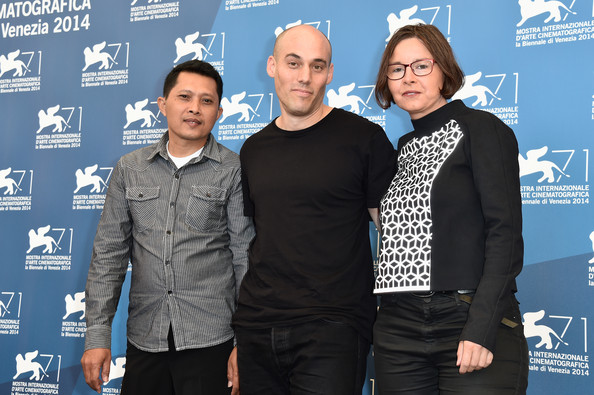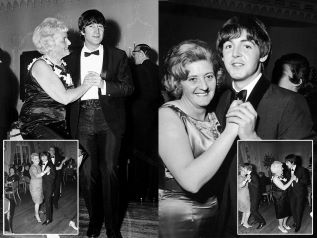Film `The Look of Silence` tentang Korban Pembunuhan 1965 Masuk Nominasi Oscar
In Indonesia, an Oscar-nominated Film Reopens Old Wounds
Editor : Ismail Gani
Translator : Novita Cahyadi

PRODUKSI film pertama di Indonesia yang akan dinominasikan untuk Oscar menjadi kebanggaan nasional sekaligus membuka aib dari negara demokrasi terbesar ketiga di dunia.
Film "The Look of Silence" atau 'Senyap' bertutur tentang pembantaian massal terburuk setelah Perang Dunia II, ketika sedikitnya 500.000 orang tewas dalam aksi kekerasan yang berkobar di Indonesia setelah Jenderal Soeharto dan militer mengambil alih kekuasaan menyusul kudeta yang gagal pada 1965. Satu juta orang atau lebih dipenjara, lantaran dicurigai sebagai komunis.
Terpilih sebagai film dokumenter terbaik pada ajang Sunday's Academy Awards pada Minggu, film ini mengungkap banyak hal tentang periode terkelam dalam sejarah Indonesia dan dilarang diputar di bioskop komersial, seperti dikutip Reuters yang dilansir MailOnline.
"Pemerintahan di Indonesia telah gagal untuk mengatasi peristiwa 1965 sebagai pelajaran yang harus diketahui oleh bangsa Indonesia," kata Muhammad Nur Khoiron dari Komisi Nasional Hak Asasi Manusia (Komnas HAM).
"Setidaknya perlu ada pengakuan resmi tapi hal itu tidak pernah terjadi. Namun kami merasa senang film ini telah dinominasikan sehingga dunia dapat melihat peristiwa yang terus dipertanyakan."
Para pejabat pemerintah Indonesia tidak menanggapi permintaan berulang kali untuk mengomentari film tersebut.
Meskipun dilarang, film 'Senyap', yang didukung oleh co-produser dari Indonesia, dapat dilihat secara online dan telah ratusan kali diputar di kalangan terbatas.
Nominasi tahun ini akan menjadi yang kedua bagi sutradara Joshua Oppenheimer, dengan tema sama pada film 'The Act of Killing' yang gagal meraih penghargaan Oscar dalam kategori film dokumenter terbaik pada 2013.
Sementara film pertama tentang peristiwa 1965 yang bertutur tentang para pelaku pembantaian yang bertobat tapi tidak pernah dipenjara, film 'Senyap' menceritakan kisah yang sama dari sudut pandang keluarga korban.
Dalam film itu Adi Rukun berhadapan dengan diduga pelaku penyiksaan dugaan dan pembunuh dari tiga bersaudara itu.
"Itu adalah hal yang paling sulit yang saya lakukan dalam hidup saya," kata Rukun dalam sebuah wawancara telepon. "Apa yang saya inginkan adalah mendengar pengakuan, tapi saya melihat mereka tidak merasakan penyesalan."
Kedua film tersebut melacak lebih jauh perjalanan katarsis dari mereka yang terlibat untuk menunjukkan banyak pihak terkait menutup mata terhadap kejahatan masa lalu.
"Saya berharap film akan memberikan energi terhadap gerakan di Indonesia melawan impunitas dan terhadap sistem didasarkan pada ketakutan dan intimidasi," kata Oppenheimer kepada Reuters.
Indonesia memulai transisi ke demokrasi pada 1998 setelah lebih dari tiga dekade di bawah kendali pemerintahan otoriter.
Pada Pemilu 2014 Joko Widodo terpilih sebagai presiden, pemimpin pertama yang berasal dari luar lingkaran elit politik dan militer Indonesia, yang menawarkan harapan untuk aktivis hak asasi manusia bahwa pelanggaran masa lalu akhirnya akan ditangani.
Namun hal itu belum terwujud, dan tahun lalu Indonesia melarang beberapa acara untuk menandai peringatan 50 tahun dari pembunuhan 1965.
"Harapannya adalah kecil," kata Nur Khoiron. "Tapi film ini adalah langkah untuk rekonsiliasi dengan masa lalu."
INDONESIA'S first film production to be nominated for an Oscar is at once a source of national pride and of shame for the world's third-largest democracy.
"The Look of Silence" centres on one of the worst massacres since World War Two, when at least 500,000 people died in violence that raged after then-general Suharto and the military took power following an abortive coup in 1965. A million or more people were jailed, suspected of being communists.
Up for best documentary at Sunday's Academy Awards ceremony, the film has forced many to confront one of the darkest periods in Indonesia's history and remains banned from commercial cinemas.
"Successive governments have failed to address the events of 1965 as a lesson that needs to be learned by the nation," said Muhammad Nurkhoiron of the national commission on human rights.
"There needs to at least be official recognition but that hasn't happened. But we feel happy this film has been nominated so the world can see those events are finally being questioned."
Government officials did not respond to repeated requests for comment on the film.
Despite the ban, "The Look of Silence", which has an Indonesian co-producer, is available online and had hundreds of private screenings across Indonesia.
This year's nomination will be the second for director Joshua Oppenheimer, whose similarly-themed "The Act of Killing" lost out in the best documentary category in 2013.
While the first film unveiled some of 1965's unrepentant killers who still remain free, "The Look of Silence" tells the same tale through the eyes of a victim's family.
In the film Adi Rukun comes face to face with the alleged torturers and killers of his three siblings.
"It was the hardest thing I've done in my life," Rukun said in a telephone interview. "What I wanted was to hear a confession, but I saw them feel no remorse."
The films go beyond tracking the cathartic journeys of those involved to show how many continue to turn a blind eye to past crimes.
"I hope the films will energise the movement in Indonesia against impunity and against a system based on fear and intimidation," Oppenheimer told Reuters by telephone.
Indonesia began a transition to democracy in 1998 after more than three decades of authoritarian rule.
The 2014 election of Joko Widodo as president, the first leader to come from outside the country's political and military establishment, offered hope to human rights activists that past violations would finally be addressed.
That has not happened, and last year Indonesia censored several events to mark the 50th anniversary of the 1965 killings.
"The hope is small," said Nurkhoiron. "But these films are a step to reconciliation with the past."















